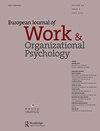Work-Nonwork Interface and Career Success: Examining Behavioural and Affective Linking Mechanisms
IF 3.4
2区 心理学
Q2 MANAGEMENT
European Journal of Work and Organizational Psychology
Pub Date : 2023-02-09
DOI:10.1080/1359432X.2023.2173066
引用次数: 2
Abstract
ABSTRACT Past research has illustrated that experiences at the work-nonwork interface are related to the achievement of objective and subjective career success. However, the mechanisms linking positive and negative work-nonwork experiences and career success have not received much attention. Based on the conservation of resources theory and the source attribution perspective, we propose behavioural (i.e., through career engagement) and affective (i.e., through positive and negative affect at work) mechanisms linking positive and negative work-nonwork experiences (i.e., work-to-nonwork enrichment and interference) to objective (i.e., salary) and subjective (i.e., career satisfaction) career success. The results of a time-lagged study (N = 812) performed over one year with three measurement waves with young employees (18–35 years old, 47% females) provided partial support for both mechanisms and showed that career engagement mediated the positive relation between work-to-nonwork enrichment and both career success dimensions. However, unexpectedly, work-to-nonwork interference was also positively associated with salary and career satisfaction through increased career engagement. Additionally, negative affect at work mediated the negative relation between work-to-nonwork interference and both career success dimensions, but this mediation was stronger for career satisfaction. The study implies that behavioural and affective mechanisms differentially link work-nonwork experiences and various forms of career success.工作-非工作界面与职业成功:行为和情感联系机制的检验
过去的研究表明,工作与非工作界面的经验与客观和主观职业成功的实现有关。然而,将积极和消极的非工作经历与职业成功联系起来的机制并没有得到太多关注。基于资源守恒理论和资源归因视角,我们提出了行为(即通过职业参与)和情感(即通过工作中的积极和消极影响)机制,将积极和消极的非工作经验(即工作对非工作的丰富和干扰)与客观(即工资)和主观(即职业满意度)的职业成功联系起来。时间滞后研究的结果(N = 812)对年轻员工(18-35岁)进行了为期一年的三次测量 岁,47%的女性)为这两种机制提供了部分支持,并表明职业参与介导了工作与非工作充实以及两个职业成功维度之间的积极关系。然而,出乎意料的是,通过增加职业参与度,工作对非工作的干扰也与工资和职业满意度呈正相关。此外,工作中的负面影响介导了工作与非工作干扰之间的负面关系以及两个职业成功维度,但这种中介作用对职业满意度更强。该研究表明,行为和情感机制将工作以外的经历与各种形式的职业成功联系起来。
本文章由计算机程序翻译,如有差异,请以英文原文为准。
求助全文
约1分钟内获得全文
求助全文
来源期刊
CiteScore
8.00
自引率
2.30%
发文量
40
期刊介绍:
The mission of the European Journal of Work and Organizational Psychology is to promote and support the development of Work and Organizational Psychology by publishing high-quality scientific articles that improve our understanding of phenomena occurring in work and organizational settings. The journal publishes empirical, theoretical, methodological, and review articles that are relevant to real-world situations. The journal has a world-wide authorship, readership and editorial board. Submissions from all around the world are invited.

 求助内容:
求助内容: 应助结果提醒方式:
应助结果提醒方式:


